Exploring Emotional Intelligence & Interpersonal Relationships
VerifiedAdded on 2020/07/22
|14
|4978
|92
AI Summary
This assignment delves into the realms of emotional intelligence and interpersonal relationships, drawing from various sources such as Goleman et al.'s 'Primal Leadership', Hargreaves' 'Interpersonal Relations and Education', and Pietromonaco & Collins' 'Interpersonal Mechanisms Linking Close Relationships to Health'. Students are required to explore how these concepts influence leadership styles, employee behavior, and overall well-being. The assignment encourages a comprehensive understanding of the subject matter through critical analysis and application.
Contribute Materials
Your contribution can guide someone’s learning journey. Share your
documents today.
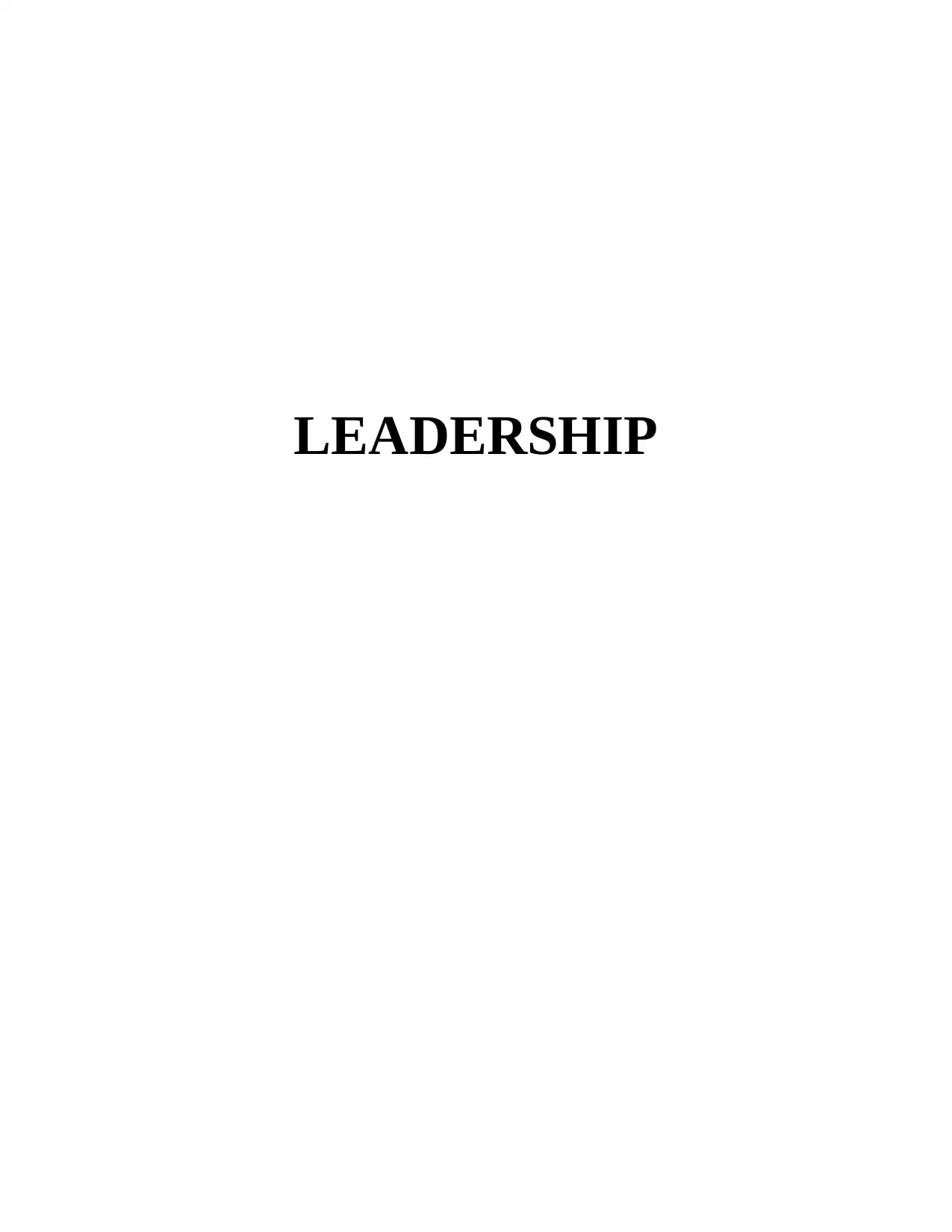
LEADERSHIP
Secure Best Marks with AI Grader
Need help grading? Try our AI Grader for instant feedback on your assignments.
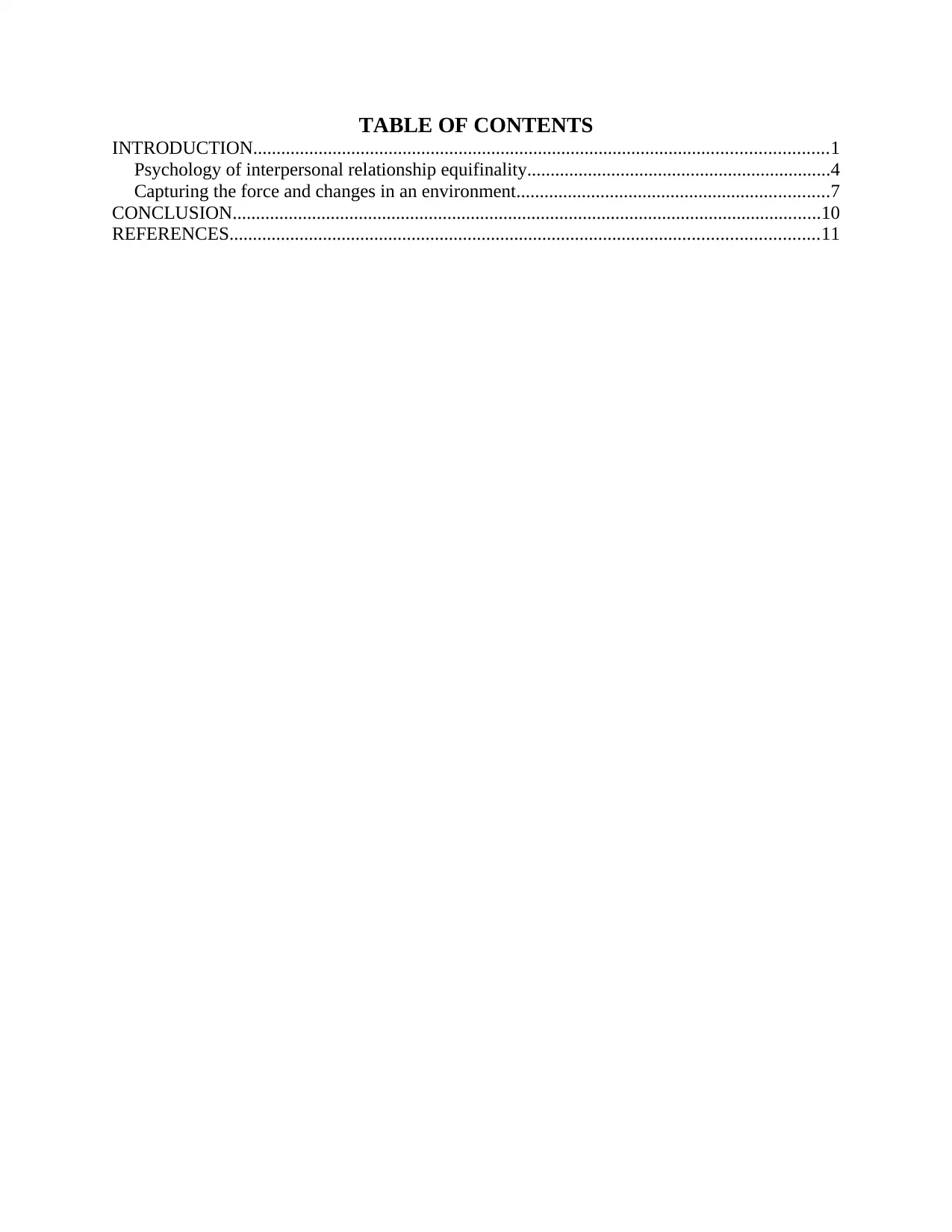
TABLE OF CONTENTS
INTRODUCTION...........................................................................................................................1
Psychology of interpersonal relationship equifinality.................................................................4
Capturing the force and changes in an environment...................................................................7
CONCLUSION..............................................................................................................................10
REFERENCES..............................................................................................................................11
INTRODUCTION...........................................................................................................................1
Psychology of interpersonal relationship equifinality.................................................................4
Capturing the force and changes in an environment...................................................................7
CONCLUSION..............................................................................................................................10
REFERENCES..............................................................................................................................11
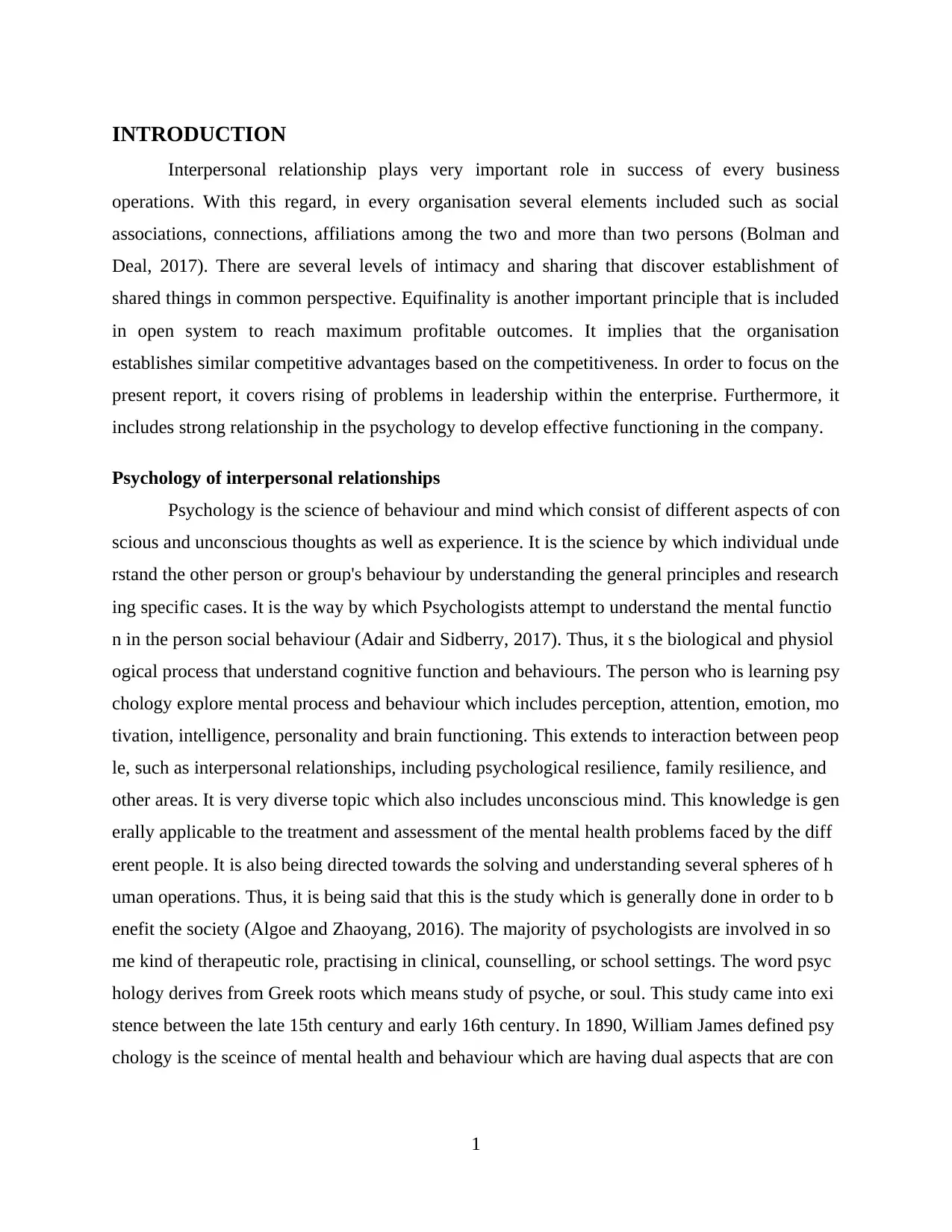
INTRODUCTION
Interpersonal relationship plays very important role in success of every business
operations. With this regard, in every organisation several elements included such as social
associations, connections, affiliations among the two and more than two persons (Bolman and
Deal, 2017). There are several levels of intimacy and sharing that discover establishment of
shared things in common perspective. Equifinality is another important principle that is included
in open system to reach maximum profitable outcomes. It implies that the organisation
establishes similar competitive advantages based on the competitiveness. In order to focus on the
present report, it covers rising of problems in leadership within the enterprise. Furthermore, it
includes strong relationship in the psychology to develop effective functioning in the company.
Psychology of interpersonal relationships
Psychology is the science of behaviour and mind which consist of different aspects of con
scious and unconscious thoughts as well as experience. It is the science by which individual unde
rstand the other person or group's behaviour by understanding the general principles and research
ing specific cases. It is the way by which Psychologists attempt to understand the mental functio
n in the person social behaviour (Adair and Sidberry, 2017). Thus, it s the biological and physiol
ogical process that understand cognitive function and behaviours. The person who is learning psy
chology explore mental process and behaviour which includes perception, attention, emotion, mo
tivation, intelligence, personality and brain functioning. This extends to interaction between peop
le, such as interpersonal relationships, including psychological resilience, family resilience, and
other areas. It is very diverse topic which also includes unconscious mind. This knowledge is gen
erally applicable to the treatment and assessment of the mental health problems faced by the diff
erent people. It is also being directed towards the solving and understanding several spheres of h
uman operations. Thus, it is being said that this is the study which is generally done in order to b
enefit the society (Algoe and Zhaoyang, 2016). The majority of psychologists are involved in so
me kind of therapeutic role, practising in clinical, counselling, or school settings. The word psyc
hology derives from Greek roots which means study of psyche, or soul. This study came into exi
stence between the late 15th century and early 16th century. In 1890, William James defined psy
chology is the sceince of mental health and behaviour which are having dual aspects that are con
1
Interpersonal relationship plays very important role in success of every business
operations. With this regard, in every organisation several elements included such as social
associations, connections, affiliations among the two and more than two persons (Bolman and
Deal, 2017). There are several levels of intimacy and sharing that discover establishment of
shared things in common perspective. Equifinality is another important principle that is included
in open system to reach maximum profitable outcomes. It implies that the organisation
establishes similar competitive advantages based on the competitiveness. In order to focus on the
present report, it covers rising of problems in leadership within the enterprise. Furthermore, it
includes strong relationship in the psychology to develop effective functioning in the company.
Psychology of interpersonal relationships
Psychology is the science of behaviour and mind which consist of different aspects of con
scious and unconscious thoughts as well as experience. It is the science by which individual unde
rstand the other person or group's behaviour by understanding the general principles and research
ing specific cases. It is the way by which Psychologists attempt to understand the mental functio
n in the person social behaviour (Adair and Sidberry, 2017). Thus, it s the biological and physiol
ogical process that understand cognitive function and behaviours. The person who is learning psy
chology explore mental process and behaviour which includes perception, attention, emotion, mo
tivation, intelligence, personality and brain functioning. This extends to interaction between peop
le, such as interpersonal relationships, including psychological resilience, family resilience, and
other areas. It is very diverse topic which also includes unconscious mind. This knowledge is gen
erally applicable to the treatment and assessment of the mental health problems faced by the diff
erent people. It is also being directed towards the solving and understanding several spheres of h
uman operations. Thus, it is being said that this is the study which is generally done in order to b
enefit the society (Algoe and Zhaoyang, 2016). The majority of psychologists are involved in so
me kind of therapeutic role, practising in clinical, counselling, or school settings. The word psyc
hology derives from Greek roots which means study of psyche, or soul. This study came into exi
stence between the late 15th century and early 16th century. In 1890, William James defined psy
chology is the sceince of mental health and behaviour which are having dual aspects that are con
1
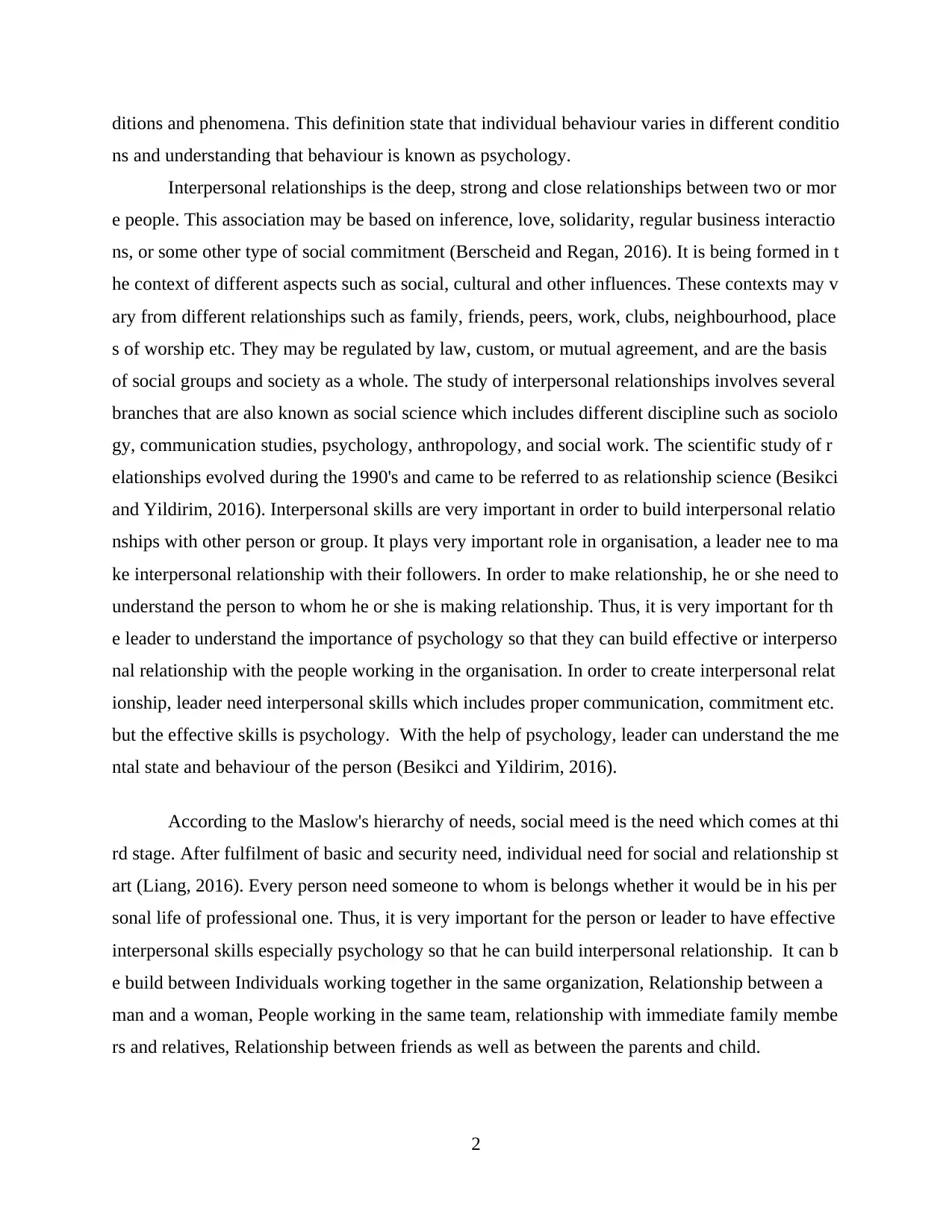
ditions and phenomena. This definition state that individual behaviour varies in different conditio
ns and understanding that behaviour is known as psychology.
Interpersonal relationships is the deep, strong and close relationships between two or mor
e people. This association may be based on inference, love, solidarity, regular business interactio
ns, or some other type of social commitment (Berscheid and Regan, 2016). It is being formed in t
he context of different aspects such as social, cultural and other influences. These contexts may v
ary from different relationships such as family, friends, peers, work, clubs, neighbourhood, place
s of worship etc. They may be regulated by law, custom, or mutual agreement, and are the basis
of social groups and society as a whole. The study of interpersonal relationships involves several
branches that are also known as social science which includes different discipline such as sociolo
gy, communication studies, psychology, anthropology, and social work. The scientific study of r
elationships evolved during the 1990's and came to be referred to as relationship science (Besikci
and Yildirim, 2016). Interpersonal skills are very important in order to build interpersonal relatio
nships with other person or group. It plays very important role in organisation, a leader nee to ma
ke interpersonal relationship with their followers. In order to make relationship, he or she need to
understand the person to whom he or she is making relationship. Thus, it is very important for th
e leader to understand the importance of psychology so that they can build effective or interperso
nal relationship with the people working in the organisation. In order to create interpersonal relat
ionship, leader need interpersonal skills which includes proper communication, commitment etc.
but the effective skills is psychology. With the help of psychology, leader can understand the me
ntal state and behaviour of the person (Besikci and Yildirim, 2016).
According to the Maslow's hierarchy of needs, social meed is the need which comes at thi
rd stage. After fulfilment of basic and security need, individual need for social and relationship st
art (Liang, 2016). Every person need someone to whom is belongs whether it would be in his per
sonal life of professional one. Thus, it is very important for the person or leader to have effective
interpersonal skills especially psychology so that he can build interpersonal relationship. It can b
e build between Individuals working together in the same organization, Relationship between a
man and a woman, People working in the same team, relationship with immediate family membe
rs and relatives, Relationship between friends as well as between the parents and child.
2
ns and understanding that behaviour is known as psychology.
Interpersonal relationships is the deep, strong and close relationships between two or mor
e people. This association may be based on inference, love, solidarity, regular business interactio
ns, or some other type of social commitment (Berscheid and Regan, 2016). It is being formed in t
he context of different aspects such as social, cultural and other influences. These contexts may v
ary from different relationships such as family, friends, peers, work, clubs, neighbourhood, place
s of worship etc. They may be regulated by law, custom, or mutual agreement, and are the basis
of social groups and society as a whole. The study of interpersonal relationships involves several
branches that are also known as social science which includes different discipline such as sociolo
gy, communication studies, psychology, anthropology, and social work. The scientific study of r
elationships evolved during the 1990's and came to be referred to as relationship science (Besikci
and Yildirim, 2016). Interpersonal skills are very important in order to build interpersonal relatio
nships with other person or group. It plays very important role in organisation, a leader nee to ma
ke interpersonal relationship with their followers. In order to make relationship, he or she need to
understand the person to whom he or she is making relationship. Thus, it is very important for th
e leader to understand the importance of psychology so that they can build effective or interperso
nal relationship with the people working in the organisation. In order to create interpersonal relat
ionship, leader need interpersonal skills which includes proper communication, commitment etc.
but the effective skills is psychology. With the help of psychology, leader can understand the me
ntal state and behaviour of the person (Besikci and Yildirim, 2016).
According to the Maslow's hierarchy of needs, social meed is the need which comes at thi
rd stage. After fulfilment of basic and security need, individual need for social and relationship st
art (Liang, 2016). Every person need someone to whom is belongs whether it would be in his per
sonal life of professional one. Thus, it is very important for the person or leader to have effective
interpersonal skills especially psychology so that he can build interpersonal relationship. It can b
e build between Individuals working together in the same organization, Relationship between a
man and a woman, People working in the same team, relationship with immediate family membe
rs and relatives, Relationship between friends as well as between the parents and child.
2
Secure Best Marks with AI Grader
Need help grading? Try our AI Grader for instant feedback on your assignments.
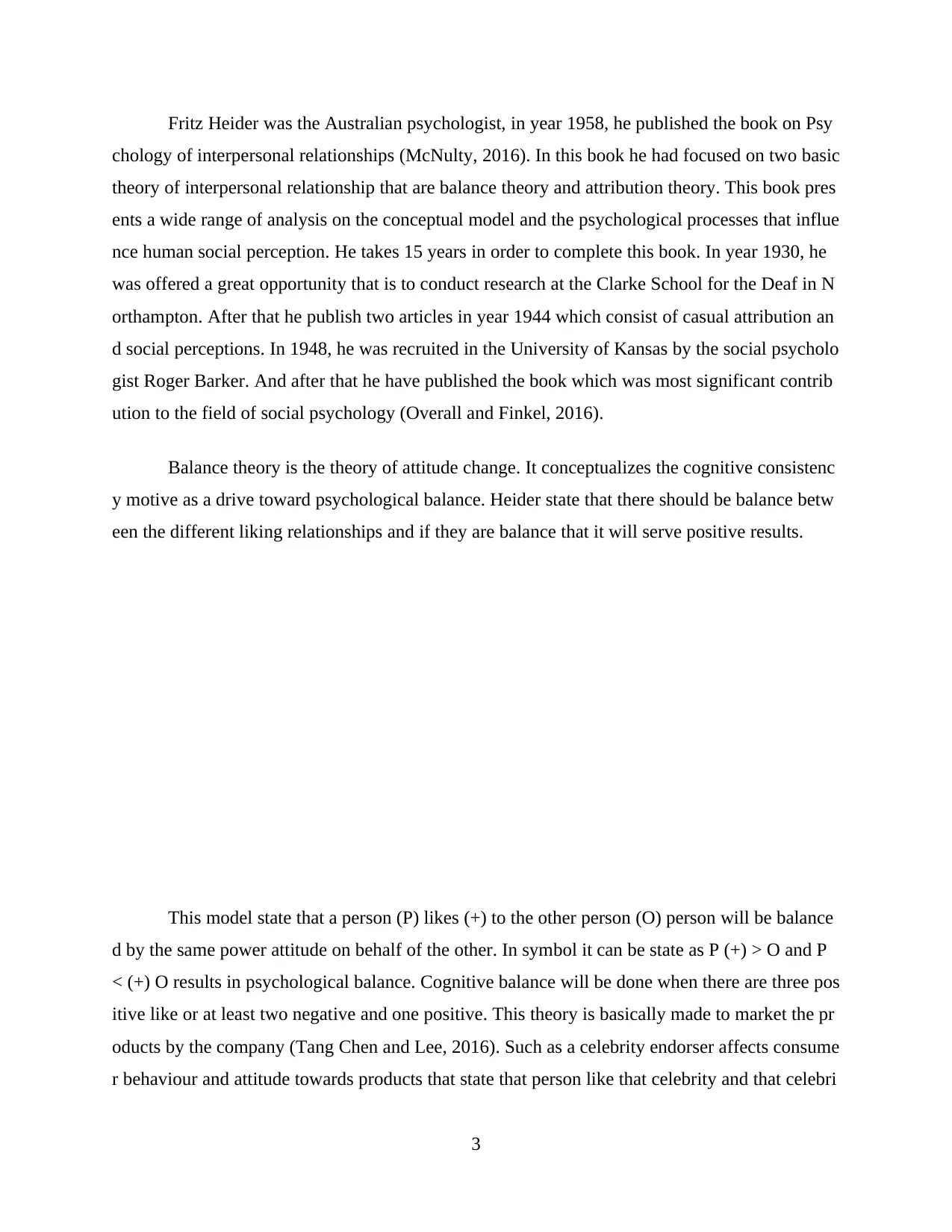
Fritz Heider was the Australian psychologist, in year 1958, he published the book on Psy
chology of interpersonal relationships (McNulty, 2016). In this book he had focused on two basic
theory of interpersonal relationship that are balance theory and attribution theory. This book pres
ents a wide range of analysis on the conceptual model and the psychological processes that influe
nce human social perception. He takes 15 years in order to complete this book. In year 1930, he
was offered a great opportunity that is to conduct research at the Clarke School for the Deaf in N
orthampton. After that he publish two articles in year 1944 which consist of casual attribution an
d social perceptions. In 1948, he was recruited in the University of Kansas by the social psycholo
gist Roger Barker. And after that he have published the book which was most significant contrib
ution to the field of social psychology (Overall and Finkel, 2016).
Balance theory is the theory of attitude change. It conceptualizes the cognitive consistenc
y motive as a drive toward psychological balance. Heider state that there should be balance betw
een the different liking relationships and if they are balance that it will serve positive results.
This model state that a person (P) likes (+) to the other person (O) person will be balance
d by the same power attitude on behalf of the other. In symbol it can be state as P (+) > O and P
< (+) O results in psychological balance. Cognitive balance will be done when there are three pos
itive like or at least two negative and one positive. This theory is basically made to market the pr
oducts by the company (Tang Chen and Lee, 2016). Such as a celebrity endorser affects consume
r behaviour and attitude towards products that state that person like that celebrity and that celebri
3
chology of interpersonal relationships (McNulty, 2016). In this book he had focused on two basic
theory of interpersonal relationship that are balance theory and attribution theory. This book pres
ents a wide range of analysis on the conceptual model and the psychological processes that influe
nce human social perception. He takes 15 years in order to complete this book. In year 1930, he
was offered a great opportunity that is to conduct research at the Clarke School for the Deaf in N
orthampton. After that he publish two articles in year 1944 which consist of casual attribution an
d social perceptions. In 1948, he was recruited in the University of Kansas by the social psycholo
gist Roger Barker. And after that he have published the book which was most significant contrib
ution to the field of social psychology (Overall and Finkel, 2016).
Balance theory is the theory of attitude change. It conceptualizes the cognitive consistenc
y motive as a drive toward psychological balance. Heider state that there should be balance betw
een the different liking relationships and if they are balance that it will serve positive results.
This model state that a person (P) likes (+) to the other person (O) person will be balance
d by the same power attitude on behalf of the other. In symbol it can be state as P (+) > O and P
< (+) O results in psychological balance. Cognitive balance will be done when there are three pos
itive like or at least two negative and one positive. This theory is basically made to market the pr
oducts by the company (Tang Chen and Lee, 2016). Such as a celebrity endorser affects consume
r behaviour and attitude towards products that state that person like that celebrity and that celebri
3
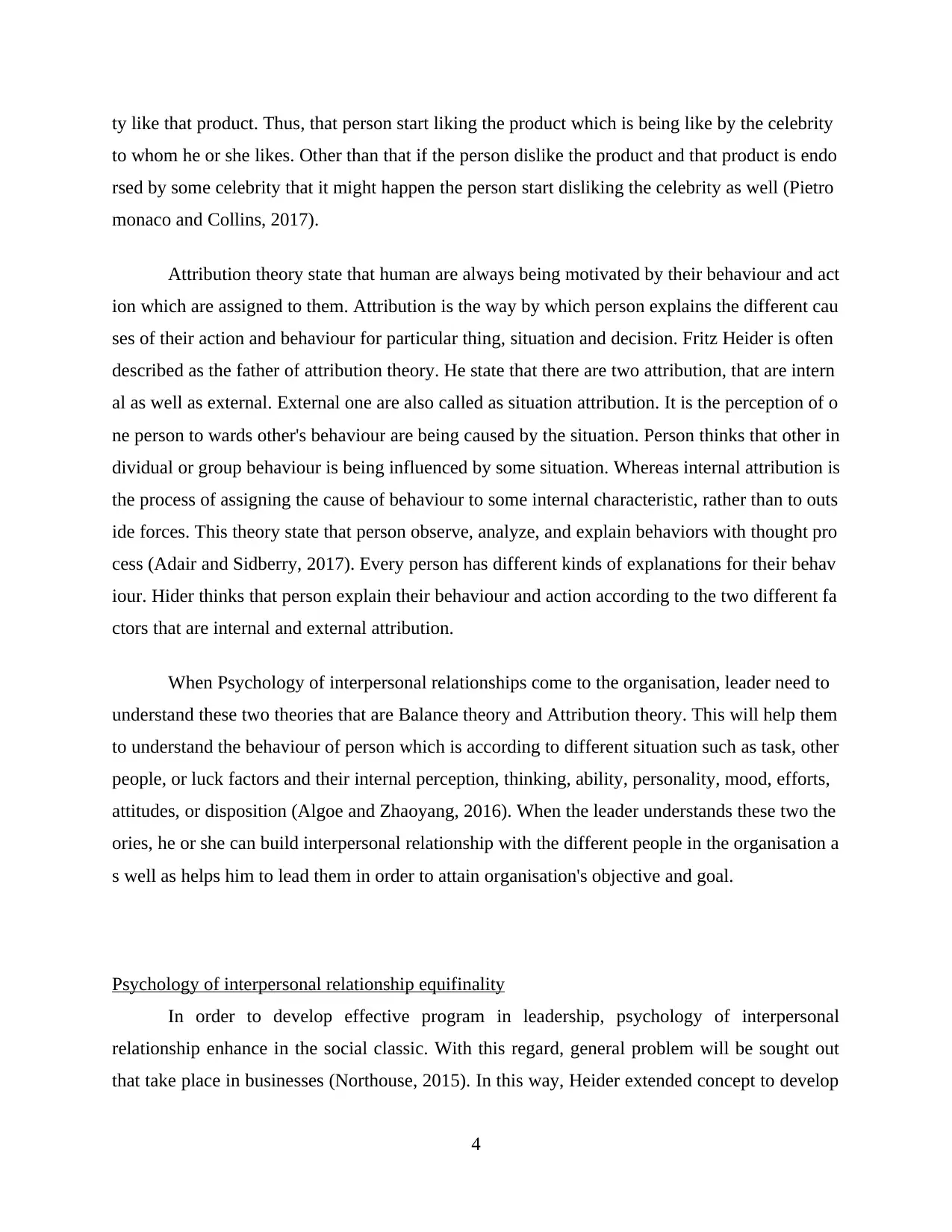
ty like that product. Thus, that person start liking the product which is being like by the celebrity
to whom he or she likes. Other than that if the person dislike the product and that product is endo
rsed by some celebrity that it might happen the person start disliking the celebrity as well (Pietro
monaco and Collins, 2017).
Attribution theory state that human are always being motivated by their behaviour and act
ion which are assigned to them. Attribution is the way by which person explains the different cau
ses of their action and behaviour for particular thing, situation and decision. Fritz Heider is often
described as the father of attribution theory. He state that there are two attribution, that are intern
al as well as external. External one are also called as situation attribution. It is the perception of o
ne person to wards other's behaviour are being caused by the situation. Person thinks that other in
dividual or group behaviour is being influenced by some situation. Whereas internal attribution is
the process of assigning the cause of behaviour to some internal characteristic, rather than to outs
ide forces. This theory state that person observe, analyze, and explain behaviors with thought pro
cess (Adair and Sidberry, 2017). Every person has different kinds of explanations for their behav
iour. Hider thinks that person explain their behaviour and action according to the two different fa
ctors that are internal and external attribution.
When Psychology of interpersonal relationships come to the organisation, leader need to
understand these two theories that are Balance theory and Attribution theory. This will help them
to understand the behaviour of person which is according to different situation such as task, other
people, or luck factors and their internal perception, thinking, ability, personality, mood, efforts,
attitudes, or disposition (Algoe and Zhaoyang, 2016). When the leader understands these two the
ories, he or she can build interpersonal relationship with the different people in the organisation a
s well as helps him to lead them in order to attain organisation's objective and goal.
Psychology of interpersonal relationship equifinality
In order to develop effective program in leadership, psychology of interpersonal
relationship enhance in the social classic. With this regard, general problem will be sought out
that take place in businesses (Northouse, 2015). In this way, Heider extended concept to develop
4
to whom he or she likes. Other than that if the person dislike the product and that product is endo
rsed by some celebrity that it might happen the person start disliking the celebrity as well (Pietro
monaco and Collins, 2017).
Attribution theory state that human are always being motivated by their behaviour and act
ion which are assigned to them. Attribution is the way by which person explains the different cau
ses of their action and behaviour for particular thing, situation and decision. Fritz Heider is often
described as the father of attribution theory. He state that there are two attribution, that are intern
al as well as external. External one are also called as situation attribution. It is the perception of o
ne person to wards other's behaviour are being caused by the situation. Person thinks that other in
dividual or group behaviour is being influenced by some situation. Whereas internal attribution is
the process of assigning the cause of behaviour to some internal characteristic, rather than to outs
ide forces. This theory state that person observe, analyze, and explain behaviors with thought pro
cess (Adair and Sidberry, 2017). Every person has different kinds of explanations for their behav
iour. Hider thinks that person explain their behaviour and action according to the two different fa
ctors that are internal and external attribution.
When Psychology of interpersonal relationships come to the organisation, leader need to
understand these two theories that are Balance theory and Attribution theory. This will help them
to understand the behaviour of person which is according to different situation such as task, other
people, or luck factors and their internal perception, thinking, ability, personality, mood, efforts,
attitudes, or disposition (Algoe and Zhaoyang, 2016). When the leader understands these two the
ories, he or she can build interpersonal relationship with the different people in the organisation a
s well as helps him to lead them in order to attain organisation's objective and goal.
Psychology of interpersonal relationship equifinality
In order to develop effective program in leadership, psychology of interpersonal
relationship enhance in the social classic. With this regard, general problem will be sought out
that take place in businesses (Northouse, 2015). In this way, Heider extended concept to develop
4
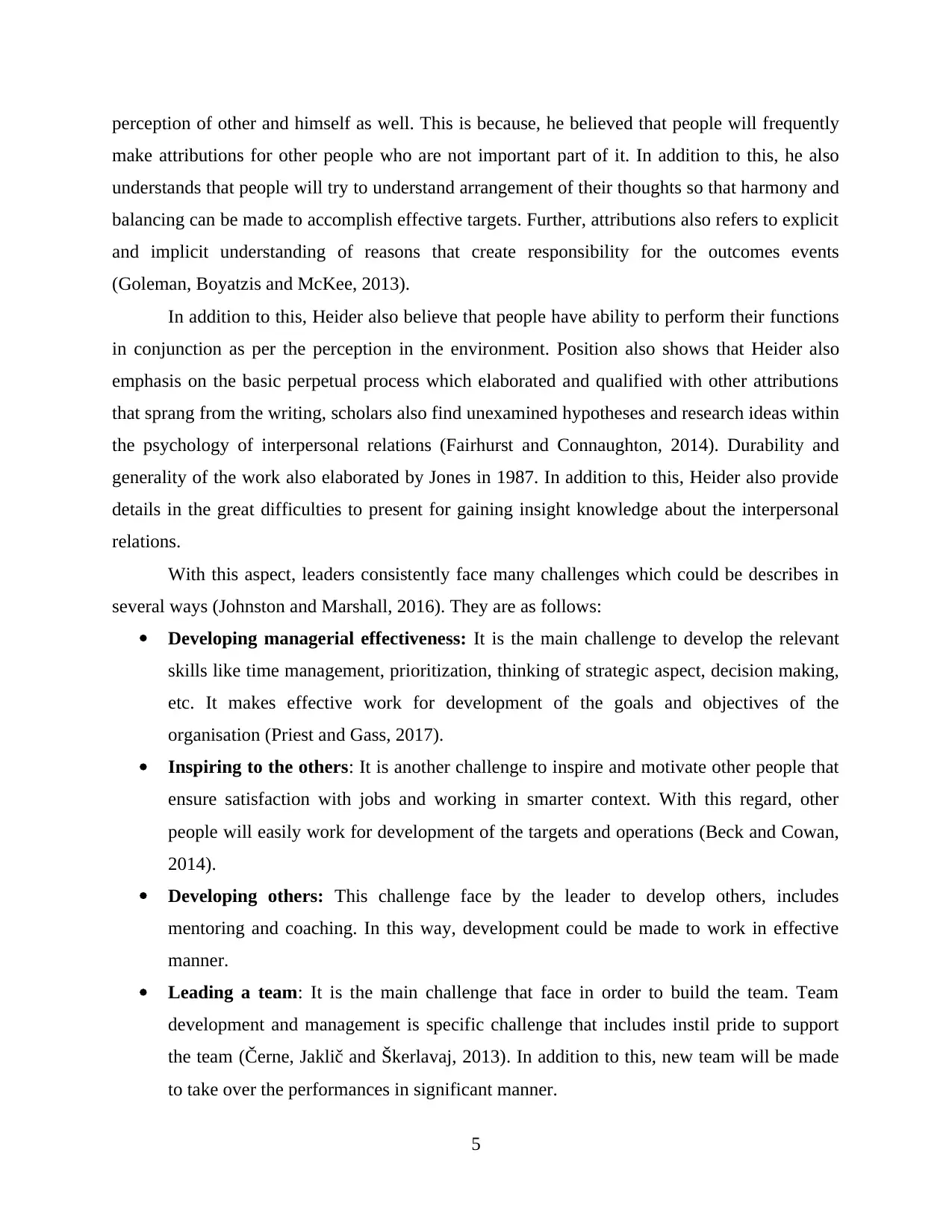
perception of other and himself as well. This is because, he believed that people will frequently
make attributions for other people who are not important part of it. In addition to this, he also
understands that people will try to understand arrangement of their thoughts so that harmony and
balancing can be made to accomplish effective targets. Further, attributions also refers to explicit
and implicit understanding of reasons that create responsibility for the outcomes events
(Goleman, Boyatzis and McKee, 2013).
In addition to this, Heider also believe that people have ability to perform their functions
in conjunction as per the perception in the environment. Position also shows that Heider also
emphasis on the basic perpetual process which elaborated and qualified with other attributions
that sprang from the writing, scholars also find unexamined hypotheses and research ideas within
the psychology of interpersonal relations (Fairhurst and Connaughton, 2014). Durability and
generality of the work also elaborated by Jones in 1987. In addition to this, Heider also provide
details in the great difficulties to present for gaining insight knowledge about the interpersonal
relations.
With this aspect, leaders consistently face many challenges which could be describes in
several ways (Johnston and Marshall, 2016). They are as follows:
Developing managerial effectiveness: It is the main challenge to develop the relevant
skills like time management, prioritization, thinking of strategic aspect, decision making,
etc. It makes effective work for development of the goals and objectives of the
organisation (Priest and Gass, 2017).
Inspiring to the others: It is another challenge to inspire and motivate other people that
ensure satisfaction with jobs and working in smarter context. With this regard, other
people will easily work for development of the targets and operations (Beck and Cowan,
2014).
Developing others: This challenge face by the leader to develop others, includes
mentoring and coaching. In this way, development could be made to work in effective
manner.
Leading a team: It is the main challenge that face in order to build the team. Team
development and management is specific challenge that includes instil pride to support
the team (Černe, Jaklič and Škerlavaj, 2013). In addition to this, new team will be made
to take over the performances in significant manner.
5
make attributions for other people who are not important part of it. In addition to this, he also
understands that people will try to understand arrangement of their thoughts so that harmony and
balancing can be made to accomplish effective targets. Further, attributions also refers to explicit
and implicit understanding of reasons that create responsibility for the outcomes events
(Goleman, Boyatzis and McKee, 2013).
In addition to this, Heider also believe that people have ability to perform their functions
in conjunction as per the perception in the environment. Position also shows that Heider also
emphasis on the basic perpetual process which elaborated and qualified with other attributions
that sprang from the writing, scholars also find unexamined hypotheses and research ideas within
the psychology of interpersonal relations (Fairhurst and Connaughton, 2014). Durability and
generality of the work also elaborated by Jones in 1987. In addition to this, Heider also provide
details in the great difficulties to present for gaining insight knowledge about the interpersonal
relations.
With this aspect, leaders consistently face many challenges which could be describes in
several ways (Johnston and Marshall, 2016). They are as follows:
Developing managerial effectiveness: It is the main challenge to develop the relevant
skills like time management, prioritization, thinking of strategic aspect, decision making,
etc. It makes effective work for development of the goals and objectives of the
organisation (Priest and Gass, 2017).
Inspiring to the others: It is another challenge to inspire and motivate other people that
ensure satisfaction with jobs and working in smarter context. With this regard, other
people will easily work for development of the targets and operations (Beck and Cowan,
2014).
Developing others: This challenge face by the leader to develop others, includes
mentoring and coaching. In this way, development could be made to work in effective
manner.
Leading a team: It is the main challenge that face in order to build the team. Team
development and management is specific challenge that includes instil pride to support
the team (Černe, Jaklič and Škerlavaj, 2013). In addition to this, new team will be made
to take over the performances in significant manner.
5
Paraphrase This Document
Need a fresh take? Get an instant paraphrase of this document with our AI Paraphraser
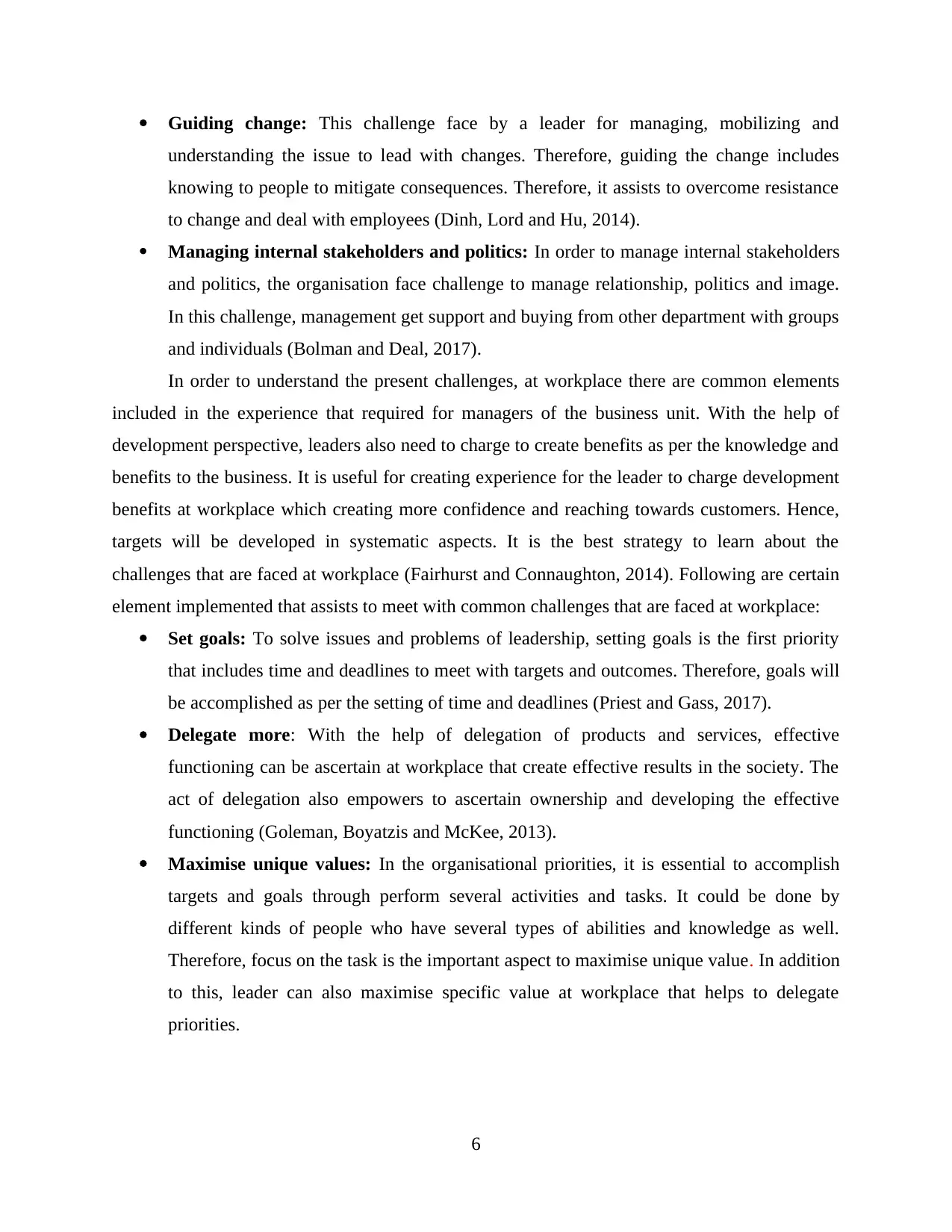
Guiding change: This challenge face by a leader for managing, mobilizing and
understanding the issue to lead with changes. Therefore, guiding the change includes
knowing to people to mitigate consequences. Therefore, it assists to overcome resistance
to change and deal with employees (Dinh, Lord and Hu, 2014).
Managing internal stakeholders and politics: In order to manage internal stakeholders
and politics, the organisation face challenge to manage relationship, politics and image.
In this challenge, management get support and buying from other department with groups
and individuals (Bolman and Deal, 2017).
In order to understand the present challenges, at workplace there are common elements
included in the experience that required for managers of the business unit. With the help of
development perspective, leaders also need to charge to create benefits as per the knowledge and
benefits to the business. It is useful for creating experience for the leader to charge development
benefits at workplace which creating more confidence and reaching towards customers. Hence,
targets will be developed in systematic aspects. It is the best strategy to learn about the
challenges that are faced at workplace (Fairhurst and Connaughton, 2014). Following are certain
element implemented that assists to meet with common challenges that are faced at workplace:
Set goals: To solve issues and problems of leadership, setting goals is the first priority
that includes time and deadlines to meet with targets and outcomes. Therefore, goals will
be accomplished as per the setting of time and deadlines (Priest and Gass, 2017).
Delegate more: With the help of delegation of products and services, effective
functioning can be ascertain at workplace that create effective results in the society. The
act of delegation also empowers to ascertain ownership and developing the effective
functioning (Goleman, Boyatzis and McKee, 2013).
Maximise unique values: In the organisational priorities, it is essential to accomplish
targets and goals through perform several activities and tasks. It could be done by
different kinds of people who have several types of abilities and knowledge as well.
Therefore, focus on the task is the important aspect to maximise unique value. In addition
to this, leader can also maximise specific value at workplace that helps to delegate
priorities.
6
understanding the issue to lead with changes. Therefore, guiding the change includes
knowing to people to mitigate consequences. Therefore, it assists to overcome resistance
to change and deal with employees (Dinh, Lord and Hu, 2014).
Managing internal stakeholders and politics: In order to manage internal stakeholders
and politics, the organisation face challenge to manage relationship, politics and image.
In this challenge, management get support and buying from other department with groups
and individuals (Bolman and Deal, 2017).
In order to understand the present challenges, at workplace there are common elements
included in the experience that required for managers of the business unit. With the help of
development perspective, leaders also need to charge to create benefits as per the knowledge and
benefits to the business. It is useful for creating experience for the leader to charge development
benefits at workplace which creating more confidence and reaching towards customers. Hence,
targets will be developed in systematic aspects. It is the best strategy to learn about the
challenges that are faced at workplace (Fairhurst and Connaughton, 2014). Following are certain
element implemented that assists to meet with common challenges that are faced at workplace:
Set goals: To solve issues and problems of leadership, setting goals is the first priority
that includes time and deadlines to meet with targets and outcomes. Therefore, goals will
be accomplished as per the setting of time and deadlines (Priest and Gass, 2017).
Delegate more: With the help of delegation of products and services, effective
functioning can be ascertain at workplace that create effective results in the society. The
act of delegation also empowers to ascertain ownership and developing the effective
functioning (Goleman, Boyatzis and McKee, 2013).
Maximise unique values: In the organisational priorities, it is essential to accomplish
targets and goals through perform several activities and tasks. It could be done by
different kinds of people who have several types of abilities and knowledge as well.
Therefore, focus on the task is the important aspect to maximise unique value. In addition
to this, leader can also maximise specific value at workplace that helps to delegate
priorities.
6
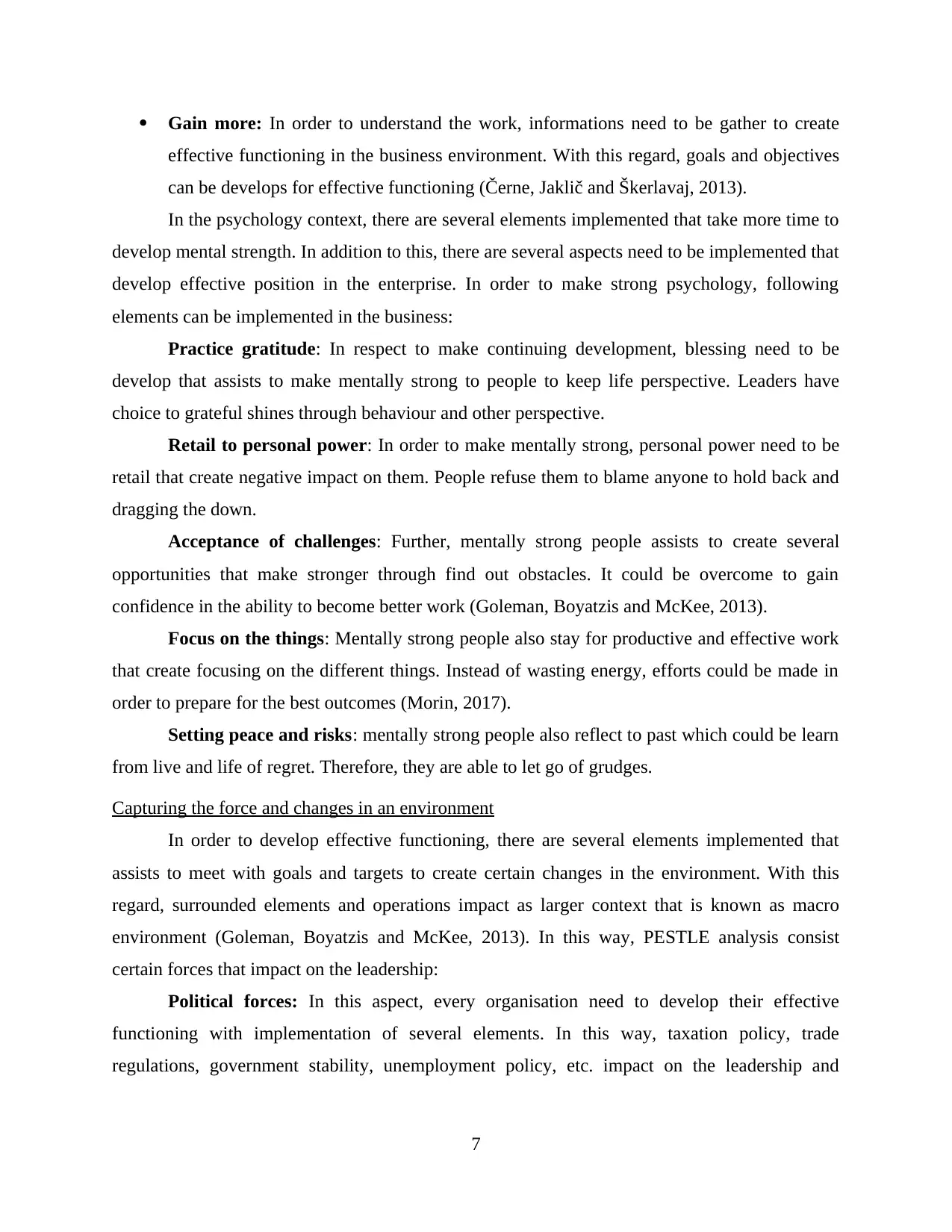
Gain more: In order to understand the work, informations need to be gather to create
effective functioning in the business environment. With this regard, goals and objectives
can be develops for effective functioning (Černe, Jaklič and Škerlavaj, 2013).
In the psychology context, there are several elements implemented that take more time to
develop mental strength. In addition to this, there are several aspects need to be implemented that
develop effective position in the enterprise. In order to make strong psychology, following
elements can be implemented in the business:
Practice gratitude: In respect to make continuing development, blessing need to be
develop that assists to make mentally strong to people to keep life perspective. Leaders have
choice to grateful shines through behaviour and other perspective.
Retail to personal power: In order to make mentally strong, personal power need to be
retail that create negative impact on them. People refuse them to blame anyone to hold back and
dragging the down.
Acceptance of challenges: Further, mentally strong people assists to create several
opportunities that make stronger through find out obstacles. It could be overcome to gain
confidence in the ability to become better work (Goleman, Boyatzis and McKee, 2013).
Focus on the things: Mentally strong people also stay for productive and effective work
that create focusing on the different things. Instead of wasting energy, efforts could be made in
order to prepare for the best outcomes (Morin, 2017).
Setting peace and risks: mentally strong people also reflect to past which could be learn
from live and life of regret. Therefore, they are able to let go of grudges.
Capturing the force and changes in an environment
In order to develop effective functioning, there are several elements implemented that
assists to meet with goals and targets to create certain changes in the environment. With this
regard, surrounded elements and operations impact as larger context that is known as macro
environment (Goleman, Boyatzis and McKee, 2013). In this way, PESTLE analysis consist
certain forces that impact on the leadership:
Political forces: In this aspect, every organisation need to develop their effective
functioning with implementation of several elements. In this way, taxation policy, trade
regulations, government stability, unemployment policy, etc. impact on the leadership and
7
effective functioning in the business environment. With this regard, goals and objectives
can be develops for effective functioning (Černe, Jaklič and Škerlavaj, 2013).
In the psychology context, there are several elements implemented that take more time to
develop mental strength. In addition to this, there are several aspects need to be implemented that
develop effective position in the enterprise. In order to make strong psychology, following
elements can be implemented in the business:
Practice gratitude: In respect to make continuing development, blessing need to be
develop that assists to make mentally strong to people to keep life perspective. Leaders have
choice to grateful shines through behaviour and other perspective.
Retail to personal power: In order to make mentally strong, personal power need to be
retail that create negative impact on them. People refuse them to blame anyone to hold back and
dragging the down.
Acceptance of challenges: Further, mentally strong people assists to create several
opportunities that make stronger through find out obstacles. It could be overcome to gain
confidence in the ability to become better work (Goleman, Boyatzis and McKee, 2013).
Focus on the things: Mentally strong people also stay for productive and effective work
that create focusing on the different things. Instead of wasting energy, efforts could be made in
order to prepare for the best outcomes (Morin, 2017).
Setting peace and risks: mentally strong people also reflect to past which could be learn
from live and life of regret. Therefore, they are able to let go of grudges.
Capturing the force and changes in an environment
In order to develop effective functioning, there are several elements implemented that
assists to meet with goals and targets to create certain changes in the environment. With this
regard, surrounded elements and operations impact as larger context that is known as macro
environment (Goleman, Boyatzis and McKee, 2013). In this way, PESTLE analysis consist
certain forces that impact on the leadership:
Political forces: In this aspect, every organisation need to develop their effective
functioning with implementation of several elements. In this way, taxation policy, trade
regulations, government stability, unemployment policy, etc. impact on the leadership and
7
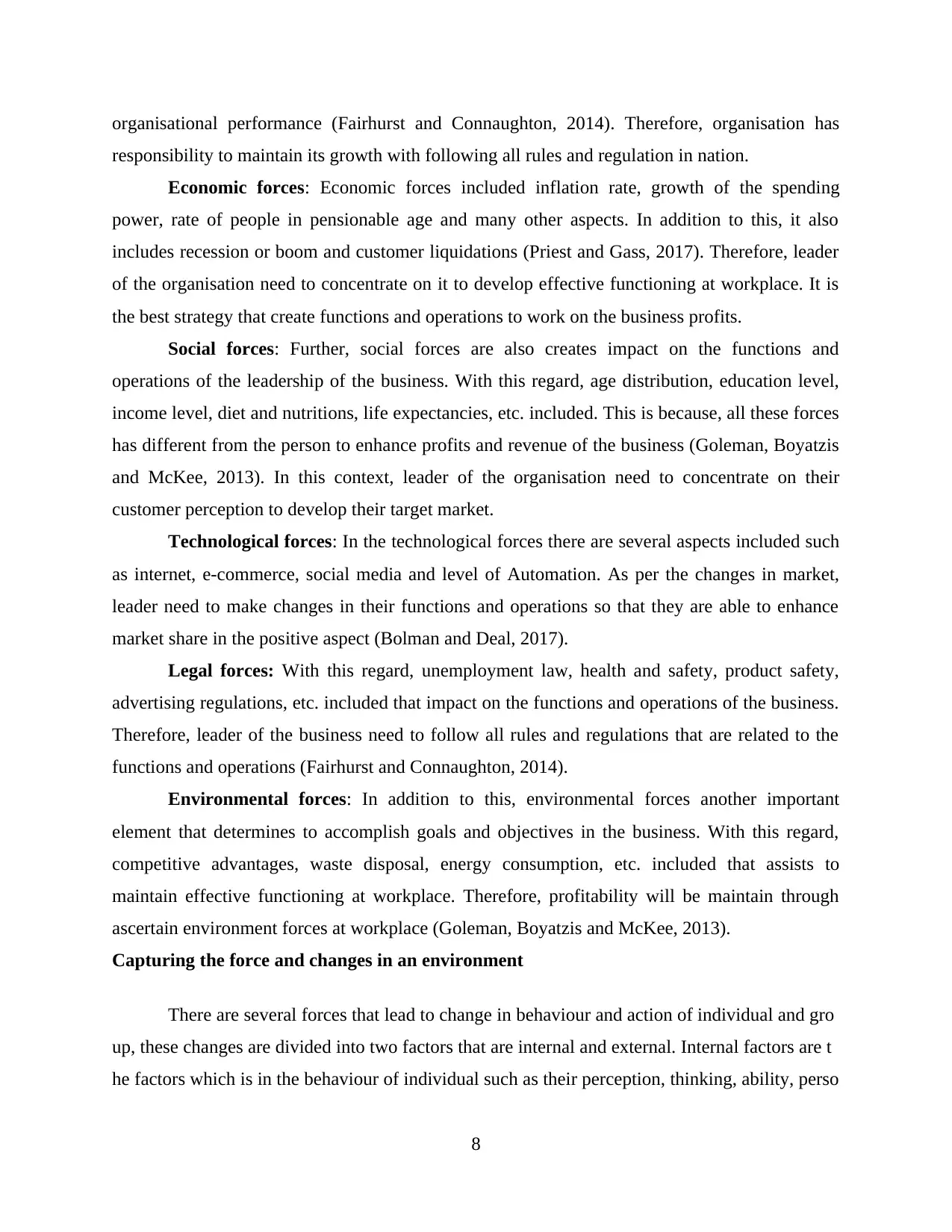
organisational performance (Fairhurst and Connaughton, 2014). Therefore, organisation has
responsibility to maintain its growth with following all rules and regulation in nation.
Economic forces: Economic forces included inflation rate, growth of the spending
power, rate of people in pensionable age and many other aspects. In addition to this, it also
includes recession or boom and customer liquidations (Priest and Gass, 2017). Therefore, leader
of the organisation need to concentrate on it to develop effective functioning at workplace. It is
the best strategy that create functions and operations to work on the business profits.
Social forces: Further, social forces are also creates impact on the functions and
operations of the leadership of the business. With this regard, age distribution, education level,
income level, diet and nutritions, life expectancies, etc. included. This is because, all these forces
has different from the person to enhance profits and revenue of the business (Goleman, Boyatzis
and McKee, 2013). In this context, leader of the organisation need to concentrate on their
customer perception to develop their target market.
Technological forces: In the technological forces there are several aspects included such
as internet, e-commerce, social media and level of Automation. As per the changes in market,
leader need to make changes in their functions and operations so that they are able to enhance
market share in the positive aspect (Bolman and Deal, 2017).
Legal forces: With this regard, unemployment law, health and safety, product safety,
advertising regulations, etc. included that impact on the functions and operations of the business.
Therefore, leader of the business need to follow all rules and regulations that are related to the
functions and operations (Fairhurst and Connaughton, 2014).
Environmental forces: In addition to this, environmental forces another important
element that determines to accomplish goals and objectives in the business. With this regard,
competitive advantages, waste disposal, energy consumption, etc. included that assists to
maintain effective functioning at workplace. Therefore, profitability will be maintain through
ascertain environment forces at workplace (Goleman, Boyatzis and McKee, 2013).
Capturing the force and changes in an environment
There are several forces that lead to change in behaviour and action of individual and gro
up, these changes are divided into two factors that are internal and external. Internal factors are t
he factors which is in the behaviour of individual such as their perception, thinking, ability, perso
8
responsibility to maintain its growth with following all rules and regulation in nation.
Economic forces: Economic forces included inflation rate, growth of the spending
power, rate of people in pensionable age and many other aspects. In addition to this, it also
includes recession or boom and customer liquidations (Priest and Gass, 2017). Therefore, leader
of the organisation need to concentrate on it to develop effective functioning at workplace. It is
the best strategy that create functions and operations to work on the business profits.
Social forces: Further, social forces are also creates impact on the functions and
operations of the leadership of the business. With this regard, age distribution, education level,
income level, diet and nutritions, life expectancies, etc. included. This is because, all these forces
has different from the person to enhance profits and revenue of the business (Goleman, Boyatzis
and McKee, 2013). In this context, leader of the organisation need to concentrate on their
customer perception to develop their target market.
Technological forces: In the technological forces there are several aspects included such
as internet, e-commerce, social media and level of Automation. As per the changes in market,
leader need to make changes in their functions and operations so that they are able to enhance
market share in the positive aspect (Bolman and Deal, 2017).
Legal forces: With this regard, unemployment law, health and safety, product safety,
advertising regulations, etc. included that impact on the functions and operations of the business.
Therefore, leader of the business need to follow all rules and regulations that are related to the
functions and operations (Fairhurst and Connaughton, 2014).
Environmental forces: In addition to this, environmental forces another important
element that determines to accomplish goals and objectives in the business. With this regard,
competitive advantages, waste disposal, energy consumption, etc. included that assists to
maintain effective functioning at workplace. Therefore, profitability will be maintain through
ascertain environment forces at workplace (Goleman, Boyatzis and McKee, 2013).
Capturing the force and changes in an environment
There are several forces that lead to change in behaviour and action of individual and gro
up, these changes are divided into two factors that are internal and external. Internal factors are t
he factors which is in the behaviour of individual such as their perception, thinking, ability, perso
8
Secure Best Marks with AI Grader
Need help grading? Try our AI Grader for instant feedback on your assignments.
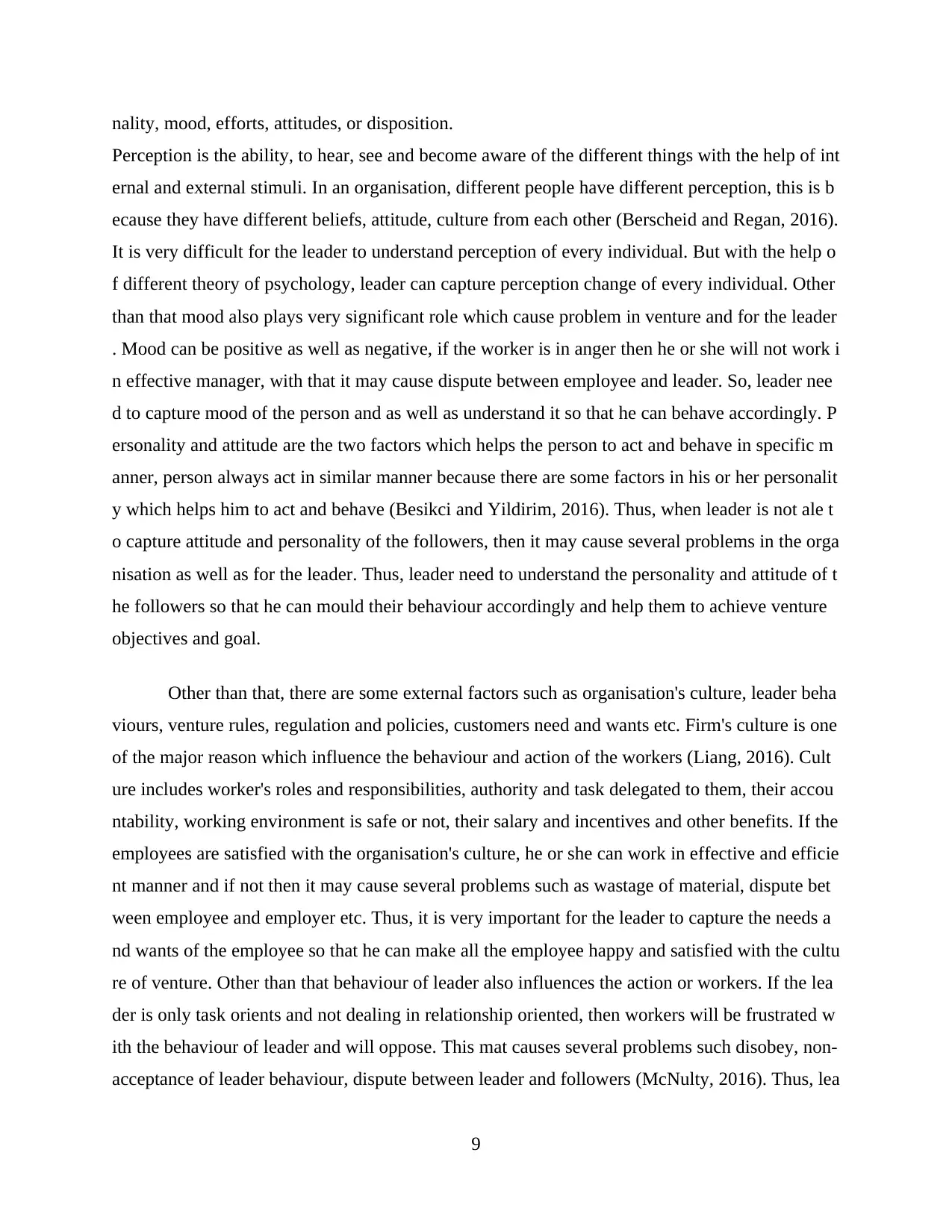
nality, mood, efforts, attitudes, or disposition.
Perception is the ability, to hear, see and become aware of the different things with the help of int
ernal and external stimuli. In an organisation, different people have different perception, this is b
ecause they have different beliefs, attitude, culture from each other (Berscheid and Regan, 2016).
It is very difficult for the leader to understand perception of every individual. But with the help o
f different theory of psychology, leader can capture perception change of every individual. Other
than that mood also plays very significant role which cause problem in venture and for the leader
. Mood can be positive as well as negative, if the worker is in anger then he or she will not work i
n effective manager, with that it may cause dispute between employee and leader. So, leader nee
d to capture mood of the person and as well as understand it so that he can behave accordingly. P
ersonality and attitude are the two factors which helps the person to act and behave in specific m
anner, person always act in similar manner because there are some factors in his or her personalit
y which helps him to act and behave (Besikci and Yildirim, 2016). Thus, when leader is not ale t
o capture attitude and personality of the followers, then it may cause several problems in the orga
nisation as well as for the leader. Thus, leader need to understand the personality and attitude of t
he followers so that he can mould their behaviour accordingly and help them to achieve venture
objectives and goal.
Other than that, there are some external factors such as organisation's culture, leader beha
viours, venture rules, regulation and policies, customers need and wants etc. Firm's culture is one
of the major reason which influence the behaviour and action of the workers (Liang, 2016). Cult
ure includes worker's roles and responsibilities, authority and task delegated to them, their accou
ntability, working environment is safe or not, their salary and incentives and other benefits. If the
employees are satisfied with the organisation's culture, he or she can work in effective and efficie
nt manner and if not then it may cause several problems such as wastage of material, dispute bet
ween employee and employer etc. Thus, it is very important for the leader to capture the needs a
nd wants of the employee so that he can make all the employee happy and satisfied with the cultu
re of venture. Other than that behaviour of leader also influences the action or workers. If the lea
der is only task orients and not dealing in relationship oriented, then workers will be frustrated w
ith the behaviour of leader and will oppose. This mat causes several problems such disobey, non-
acceptance of leader behaviour, dispute between leader and followers (McNulty, 2016). Thus, lea
9
Perception is the ability, to hear, see and become aware of the different things with the help of int
ernal and external stimuli. In an organisation, different people have different perception, this is b
ecause they have different beliefs, attitude, culture from each other (Berscheid and Regan, 2016).
It is very difficult for the leader to understand perception of every individual. But with the help o
f different theory of psychology, leader can capture perception change of every individual. Other
than that mood also plays very significant role which cause problem in venture and for the leader
. Mood can be positive as well as negative, if the worker is in anger then he or she will not work i
n effective manager, with that it may cause dispute between employee and leader. So, leader nee
d to capture mood of the person and as well as understand it so that he can behave accordingly. P
ersonality and attitude are the two factors which helps the person to act and behave in specific m
anner, person always act in similar manner because there are some factors in his or her personalit
y which helps him to act and behave (Besikci and Yildirim, 2016). Thus, when leader is not ale t
o capture attitude and personality of the followers, then it may cause several problems in the orga
nisation as well as for the leader. Thus, leader need to understand the personality and attitude of t
he followers so that he can mould their behaviour accordingly and help them to achieve venture
objectives and goal.
Other than that, there are some external factors such as organisation's culture, leader beha
viours, venture rules, regulation and policies, customers need and wants etc. Firm's culture is one
of the major reason which influence the behaviour and action of the workers (Liang, 2016). Cult
ure includes worker's roles and responsibilities, authority and task delegated to them, their accou
ntability, working environment is safe or not, their salary and incentives and other benefits. If the
employees are satisfied with the organisation's culture, he or she can work in effective and efficie
nt manner and if not then it may cause several problems such as wastage of material, dispute bet
ween employee and employer etc. Thus, it is very important for the leader to capture the needs a
nd wants of the employee so that he can make all the employee happy and satisfied with the cultu
re of venture. Other than that behaviour of leader also influences the action or workers. If the lea
der is only task orients and not dealing in relationship oriented, then workers will be frustrated w
ith the behaviour of leader and will oppose. This mat causes several problems such disobey, non-
acceptance of leader behaviour, dispute between leader and followers (McNulty, 2016). Thus, lea
9
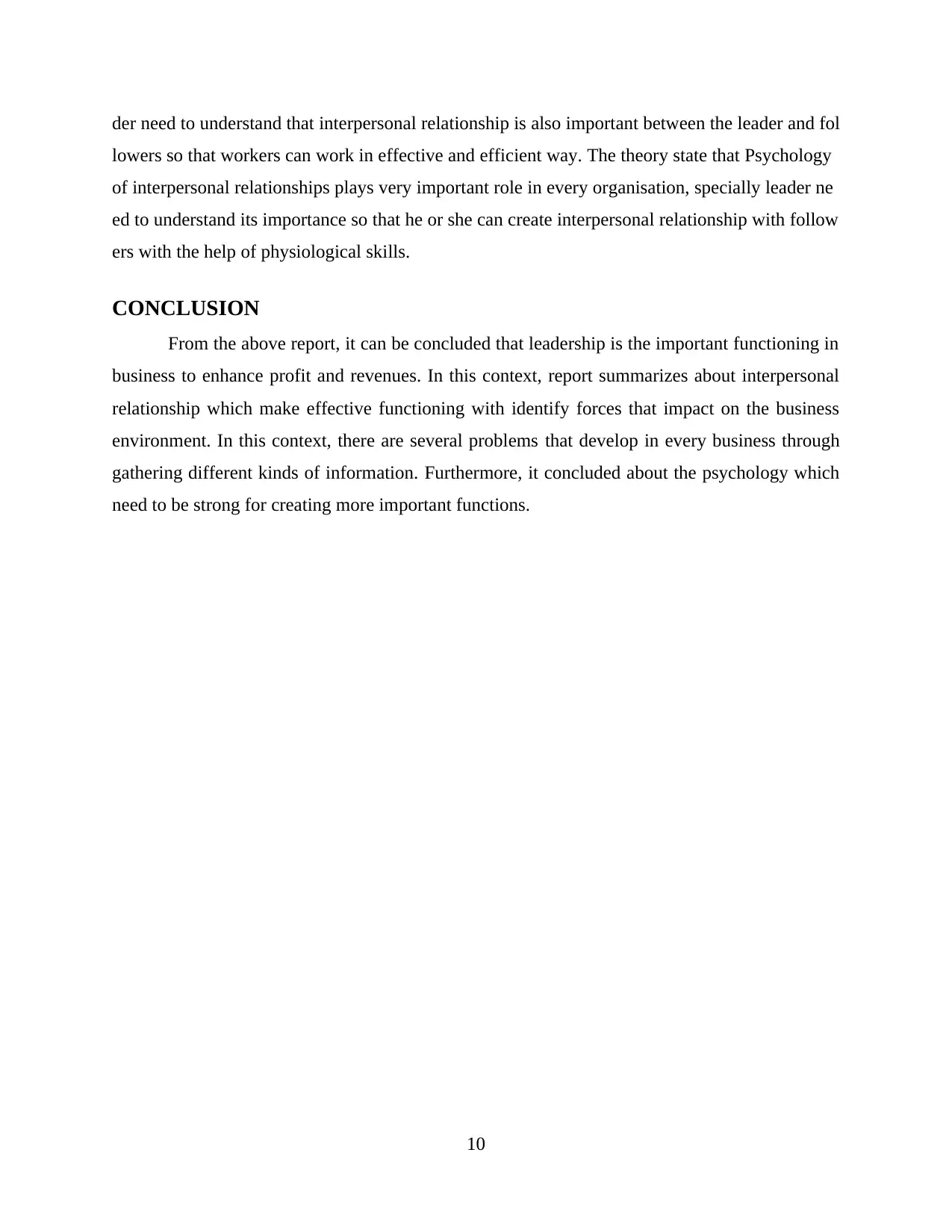
der need to understand that interpersonal relationship is also important between the leader and fol
lowers so that workers can work in effective and efficient way. The theory state that Psychology
of interpersonal relationships plays very important role in every organisation, specially leader ne
ed to understand its importance so that he or she can create interpersonal relationship with follow
ers with the help of physiological skills.
CONCLUSION
From the above report, it can be concluded that leadership is the important functioning in
business to enhance profit and revenues. In this context, report summarizes about interpersonal
relationship which make effective functioning with identify forces that impact on the business
environment. In this context, there are several problems that develop in every business through
gathering different kinds of information. Furthermore, it concluded about the psychology which
need to be strong for creating more important functions.
10
lowers so that workers can work in effective and efficient way. The theory state that Psychology
of interpersonal relationships plays very important role in every organisation, specially leader ne
ed to understand its importance so that he or she can create interpersonal relationship with follow
ers with the help of physiological skills.
CONCLUSION
From the above report, it can be concluded that leadership is the important functioning in
business to enhance profit and revenues. In this context, report summarizes about interpersonal
relationship which make effective functioning with identify forces that impact on the business
environment. In this context, there are several problems that develop in every business through
gathering different kinds of information. Furthermore, it concluded about the psychology which
need to be strong for creating more important functions.
10
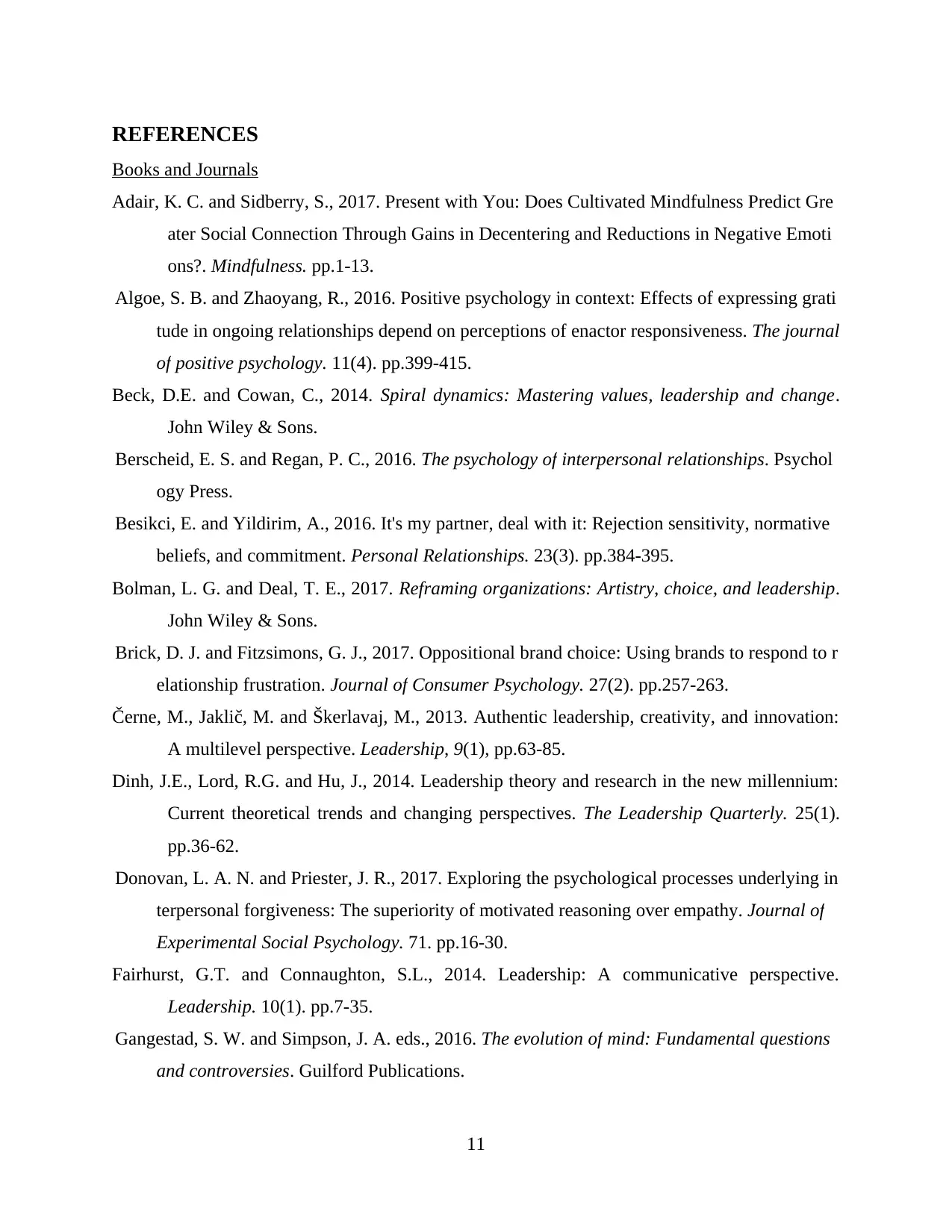
REFERENCES
Books and Journals
Adair, K. C. and Sidberry, S., 2017. Present with You: Does Cultivated Mindfulness Predict Gre
ater Social Connection Through Gains in Decentering and Reductions in Negative Emoti
ons?. Mindfulness. pp.1-13.
Algoe, S. B. and Zhaoyang, R., 2016. Positive psychology in context: Effects of expressing grati
tude in ongoing relationships depend on perceptions of enactor responsiveness. The journal
of positive psychology. 11(4). pp.399-415.
Beck, D.E. and Cowan, C., 2014. Spiral dynamics: Mastering values, leadership and change.
John Wiley & Sons.
Berscheid, E. S. and Regan, P. C., 2016. The psychology of interpersonal relationships. Psychol
ogy Press.
Besikci, E. and Yildirim, A., 2016. It's my partner, deal with it: Rejection sensitivity, normative
beliefs, and commitment. Personal Relationships. 23(3). pp.384-395.
Bolman, L. G. and Deal, T. E., 2017. Reframing organizations: Artistry, choice, and leadership.
John Wiley & Sons.
Brick, D. J. and Fitzsimons, G. J., 2017. Oppositional brand choice: Using brands to respond to r
elationship frustration. Journal of Consumer Psychology. 27(2). pp.257-263.
Černe, M., Jaklič, M. and Škerlavaj, M., 2013. Authentic leadership, creativity, and innovation:
A multilevel perspective. Leadership, 9(1), pp.63-85.
Dinh, J.E., Lord, R.G. and Hu, J., 2014. Leadership theory and research in the new millennium:
Current theoretical trends and changing perspectives. The Leadership Quarterly. 25(1).
pp.36-62.
Donovan, L. A. N. and Priester, J. R., 2017. Exploring the psychological processes underlying in
terpersonal forgiveness: The superiority of motivated reasoning over empathy. Journal of
Experimental Social Psychology. 71. pp.16-30.
Fairhurst, G.T. and Connaughton, S.L., 2014. Leadership: A communicative perspective.
Leadership. 10(1). pp.7-35.
Gangestad, S. W. and Simpson, J. A. eds., 2016. The evolution of mind: Fundamental questions
and controversies. Guilford Publications.
11
Books and Journals
Adair, K. C. and Sidberry, S., 2017. Present with You: Does Cultivated Mindfulness Predict Gre
ater Social Connection Through Gains in Decentering and Reductions in Negative Emoti
ons?. Mindfulness. pp.1-13.
Algoe, S. B. and Zhaoyang, R., 2016. Positive psychology in context: Effects of expressing grati
tude in ongoing relationships depend on perceptions of enactor responsiveness. The journal
of positive psychology. 11(4). pp.399-415.
Beck, D.E. and Cowan, C., 2014. Spiral dynamics: Mastering values, leadership and change.
John Wiley & Sons.
Berscheid, E. S. and Regan, P. C., 2016. The psychology of interpersonal relationships. Psychol
ogy Press.
Besikci, E. and Yildirim, A., 2016. It's my partner, deal with it: Rejection sensitivity, normative
beliefs, and commitment. Personal Relationships. 23(3). pp.384-395.
Bolman, L. G. and Deal, T. E., 2017. Reframing organizations: Artistry, choice, and leadership.
John Wiley & Sons.
Brick, D. J. and Fitzsimons, G. J., 2017. Oppositional brand choice: Using brands to respond to r
elationship frustration. Journal of Consumer Psychology. 27(2). pp.257-263.
Černe, M., Jaklič, M. and Škerlavaj, M., 2013. Authentic leadership, creativity, and innovation:
A multilevel perspective. Leadership, 9(1), pp.63-85.
Dinh, J.E., Lord, R.G. and Hu, J., 2014. Leadership theory and research in the new millennium:
Current theoretical trends and changing perspectives. The Leadership Quarterly. 25(1).
pp.36-62.
Donovan, L. A. N. and Priester, J. R., 2017. Exploring the psychological processes underlying in
terpersonal forgiveness: The superiority of motivated reasoning over empathy. Journal of
Experimental Social Psychology. 71. pp.16-30.
Fairhurst, G.T. and Connaughton, S.L., 2014. Leadership: A communicative perspective.
Leadership. 10(1). pp.7-35.
Gangestad, S. W. and Simpson, J. A. eds., 2016. The evolution of mind: Fundamental questions
and controversies. Guilford Publications.
11
Paraphrase This Document
Need a fresh take? Get an instant paraphrase of this document with our AI Paraphraser
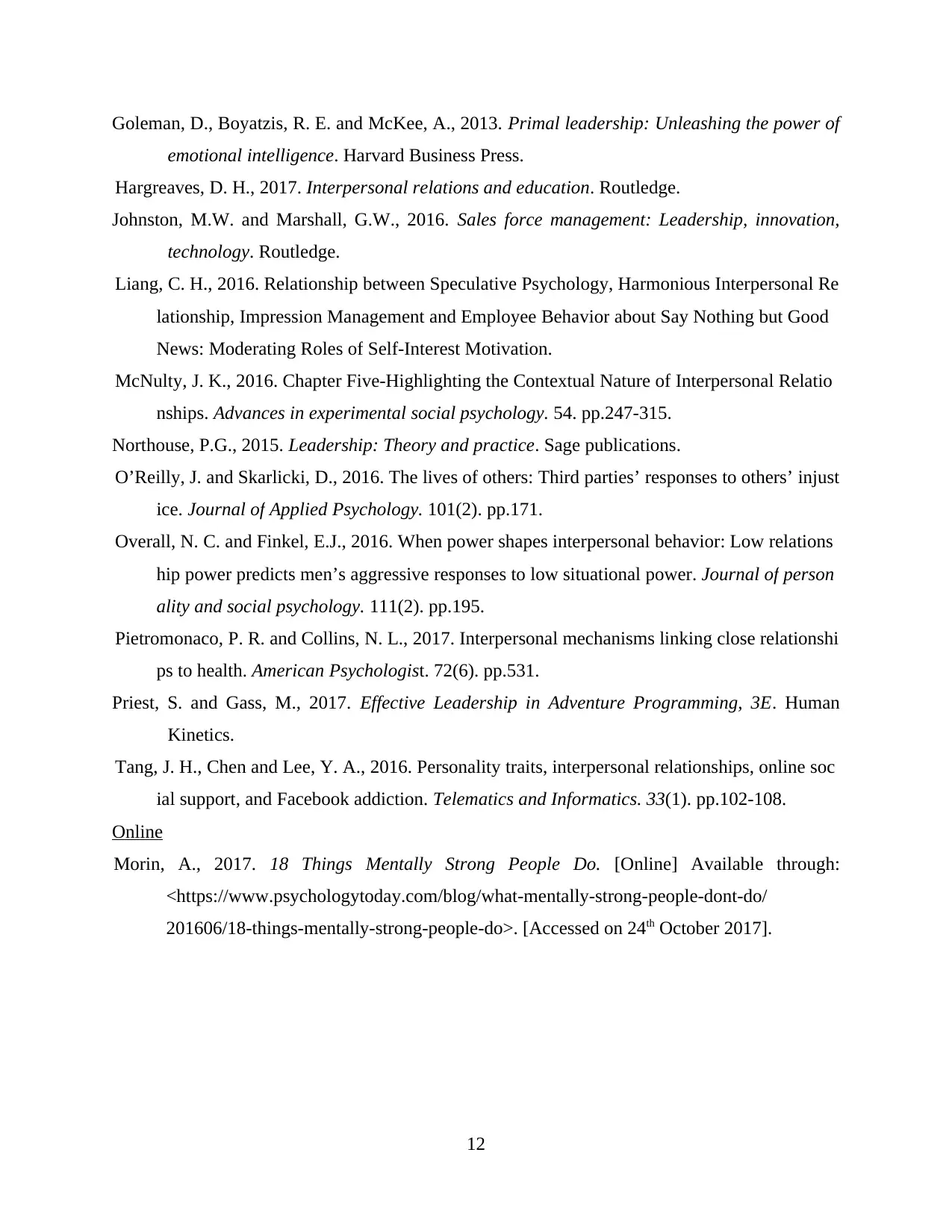
Goleman, D., Boyatzis, R. E. and McKee, A., 2013. Primal leadership: Unleashing the power of
emotional intelligence. Harvard Business Press.
Hargreaves, D. H., 2017. Interpersonal relations and education. Routledge.
Johnston, M.W. and Marshall, G.W., 2016. Sales force management: Leadership, innovation,
technology. Routledge.
Liang, C. H., 2016. Relationship between Speculative Psychology, Harmonious Interpersonal Re
lationship, Impression Management and Employee Behavior about Say Nothing but Good
News: Moderating Roles of Self-Interest Motivation.
McNulty, J. K., 2016. Chapter Five-Highlighting the Contextual Nature of Interpersonal Relatio
nships. Advances in experimental social psychology. 54. pp.247-315.
Northouse, P.G., 2015. Leadership: Theory and practice. Sage publications.
O’Reilly, J. and Skarlicki, D., 2016. The lives of others: Third parties’ responses to others’ injust
ice. Journal of Applied Psychology. 101(2). pp.171.
Overall, N. C. and Finkel, E.J., 2016. When power shapes interpersonal behavior: Low relations
hip power predicts men’s aggressive responses to low situational power. Journal of person
ality and social psychology. 111(2). pp.195.
Pietromonaco, P. R. and Collins, N. L., 2017. Interpersonal mechanisms linking close relationshi
ps to health. American Psychologist. 72(6). pp.531.
Priest, S. and Gass, M., 2017. Effective Leadership in Adventure Programming, 3E. Human
Kinetics.
Tang, J. H., Chen and Lee, Y. A., 2016. Personality traits, interpersonal relationships, online soc
ial support, and Facebook addiction. Telematics and Informatics. 33(1). pp.102-108.
Online
Morin, A., 2017. 18 Things Mentally Strong People Do. [Online] Available through:
<https://www.psychologytoday.com/blog/what-mentally-strong-people-dont-do/
201606/18-things-mentally-strong-people-do>. [Accessed on 24th October 2017].
12
emotional intelligence. Harvard Business Press.
Hargreaves, D. H., 2017. Interpersonal relations and education. Routledge.
Johnston, M.W. and Marshall, G.W., 2016. Sales force management: Leadership, innovation,
technology. Routledge.
Liang, C. H., 2016. Relationship between Speculative Psychology, Harmonious Interpersonal Re
lationship, Impression Management and Employee Behavior about Say Nothing but Good
News: Moderating Roles of Self-Interest Motivation.
McNulty, J. K., 2016. Chapter Five-Highlighting the Contextual Nature of Interpersonal Relatio
nships. Advances in experimental social psychology. 54. pp.247-315.
Northouse, P.G., 2015. Leadership: Theory and practice. Sage publications.
O’Reilly, J. and Skarlicki, D., 2016. The lives of others: Third parties’ responses to others’ injust
ice. Journal of Applied Psychology. 101(2). pp.171.
Overall, N. C. and Finkel, E.J., 2016. When power shapes interpersonal behavior: Low relations
hip power predicts men’s aggressive responses to low situational power. Journal of person
ality and social psychology. 111(2). pp.195.
Pietromonaco, P. R. and Collins, N. L., 2017. Interpersonal mechanisms linking close relationshi
ps to health. American Psychologist. 72(6). pp.531.
Priest, S. and Gass, M., 2017. Effective Leadership in Adventure Programming, 3E. Human
Kinetics.
Tang, J. H., Chen and Lee, Y. A., 2016. Personality traits, interpersonal relationships, online soc
ial support, and Facebook addiction. Telematics and Informatics. 33(1). pp.102-108.
Online
Morin, A., 2017. 18 Things Mentally Strong People Do. [Online] Available through:
<https://www.psychologytoday.com/blog/what-mentally-strong-people-dont-do/
201606/18-things-mentally-strong-people-do>. [Accessed on 24th October 2017].
12
1 out of 14
Related Documents
Your All-in-One AI-Powered Toolkit for Academic Success.
+13062052269
info@desklib.com
Available 24*7 on WhatsApp / Email
![[object Object]](/_next/static/media/star-bottom.7253800d.svg)
Unlock your academic potential
© 2024 | Zucol Services PVT LTD | All rights reserved.





